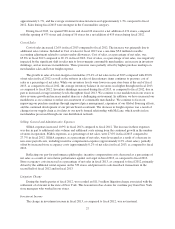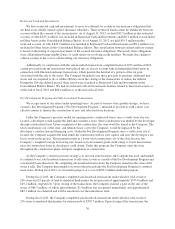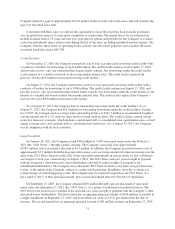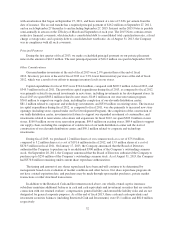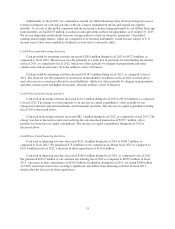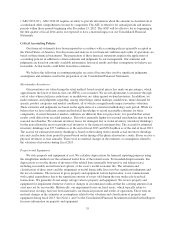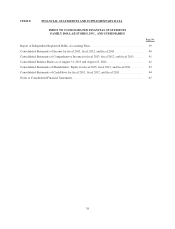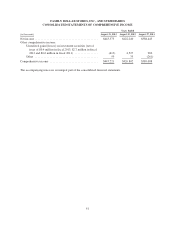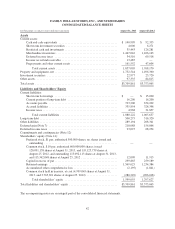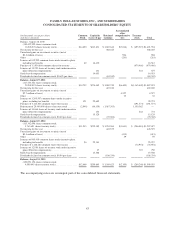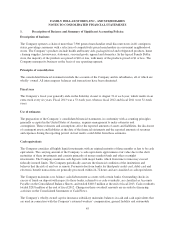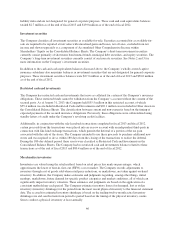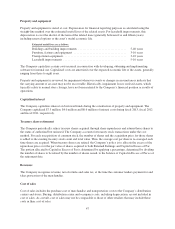Family Dollar 2013 Annual Report Download - page 41
Download and view the complete annual report
Please find page 41 of the 2013 Family Dollar annual report below. You can navigate through the pages in the report by either clicking on the pages listed below, or by using the keyword search tool below to find specific information within the annual report.
estimates or assumptions used to determine contingent legal liabilities during fiscal 2012. See Note 12 to the
Consolidated Financial Statements included in this Report for more information on our contingent legal
liabilities.
Stock-based Compensation Expense:
We measure stock-based compensation expense based on the estimated fair value of the award on the grant
date. The determination of the fair value of our employee stock options on the grant date is calculated using a
Black-Scholes option-pricing model and is affected by our stock price as well as by assumptions regarding a
number of complex and subjective variables. These variables include, but are not limited to, the expected stock
price volatility over the term of the awards, and actual and projected employee stock option exercise behaviors.
We also grant performance share rights and adjust compensation expense each quarter based on the ultimate
number of shares expected to be issued. If factors change and we employ different assumptions to measure stock-
based compensation in future periods, the compensation expense recorded may differ significantly from the
amount recorded in the current period. Our results for fiscal 2013, fiscal 2012 and fiscal 2011 include stock-
based compensation expense of $16.3 million, $15.9 million and $14.7 million, respectively. There were no
material changes in the estimates or assumptions used to determine stock-based compensation during fiscal 2013.
See Note 13 to the Consolidated Financial Statements included in this Report for more information on stock-
based compensation.
ITEM 7A. QUANTITATIVE AND QUALITATIVE DISCLOSURES ABOUT MARKET RISK
We are subject to market risk from exposure to changes in interest rates based on our financing, investing
and cash management activities. We maintain unsecured revolving credit facilities at variable rates of interest to
meet the short-term needs of our expansion program and seasonal inventory increases. We performed a
sensitivity analysis assuming a hypothetical 100 basis point movement in interest rates applied to the average
daily borrowings under our credit facility. As of August 31, 2013, the analysis indicated that such a movement
would not have a material impact on our financial position, results of operations or cash flows. During fiscal
2013 and fiscal 2012 we incurred an immaterial amount of interest expense related to our credit facilities.
We are also subject to market risk from exposure to changes in the fair value of our investment securities.
Our investment securities currently include auction rate securities that are subject to failed auctions and are not
currently liquid. As of August 31, 2013, we had a $2.7 million unrealized loss ($1.7 million net of taxes) related
to these investments. We believe we will be able to liquidate our auction rate securities at par at some point in the
future as a result of issuer calls or refinancings, repurchases by the broker dealers, or upon maturity. However,
volatility in the credit markets could continue to negatively impact the timing of future liquidity related to these
investments and lead to additional adjustments to their carrying value. We performed a sensitivity analysis
assuming a hypothetical 100 basis point movement in the illiquidity factor along with a 12-month increase or
decrease in the weighted average term. As of August 31, 2013, the analysis indicated such movement could result
in a gross unrealized loss ranging from $1.6 million to $4.7 million. See Note 2 to the Consolidated Financial
Statements included in this Report for more information.
37


